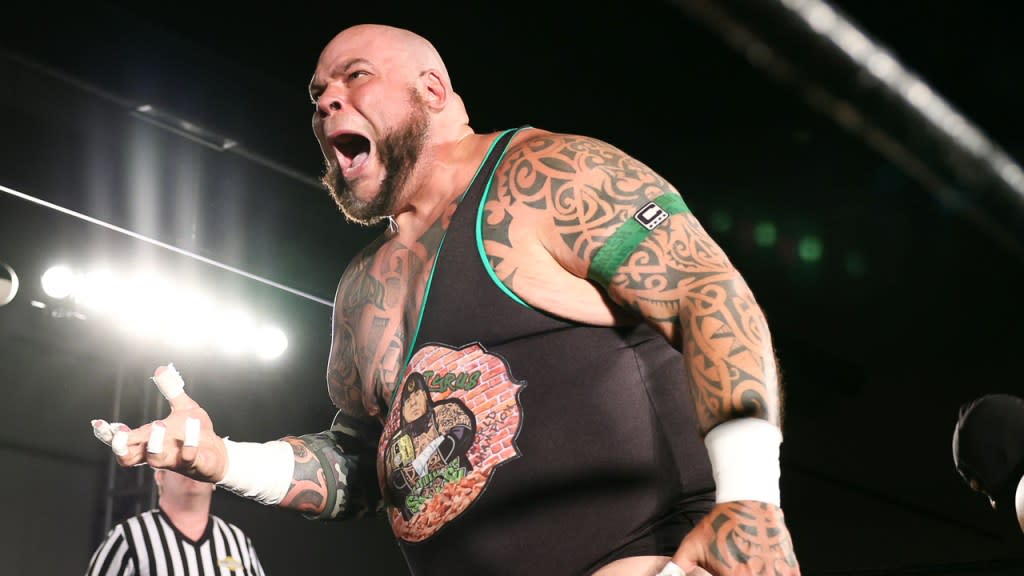The tension erupted during a segment focused on racial disparities in law enforcement—one of The View’s regular, polarizing topics. As the panel began to steer the discussion toward systemic racism, Tyrus abruptly stepped in, cutting through the usual commentary with raw, unfiltered criticism.
“This isn’t a conversation anymore,” Tyrus said firmly. “It’s a cycle. A race-obsessed echo chamber. What you’re doing is not helping people—it’s dividing them.”
A stunned silence fell across the table. Joy Behar reportedly looked off-camera, while Whoopi Goldberg attempted to pivot the topic—but Tyrus wasn’t finished.
“There are real issues out there,” he continued, “but not everything needs to be filtered through a racial lens. That’s not justice. That’s not progress. That’s propaganda.”
The live audience gasped. The hosts, usually quick with rebuttals, seemed frozen. And just like that, the tone of the entire broadcast changed.
Within hours, clips of the exchange exploded across social media platforms. Hashtags like #TyrusTruth, #TheViewExposed, and #RaceRhetoric trended globally on X (formerly Twitter), TikTok, and YouTube. Millions viewed the video, with many hailing Tyrus as a truth-teller.
“Tyrus just said what we’ve all been thinking,” one X user posted.
“That was the most honest 30 seconds in daytime TV history,” said another.
Prominent figures from conservative media applauded the moment as a necessary reckoning for what they see as ideological groupthink in legacy media. Even some moderate viewers admitted that Tyrus raised uncomfortable—but important—questions about how race is discussed in public forums.
But the response was far from unanimous.
Progressive commentators, media analysts, and academics quickly labeled Tyrus’s comments as “simplistic” and “dangerously dismissive.” Many accused him of ignoring systemic injustices and failing to acknowledge the real experiences of marginalized communities.
Dr. Laura Mason, a media studies professor at NYU, criticized the moment:
“Tyrus is playing into a populist narrative that seeks to silence conversations about racial equity by painting them as hysteria. It’s reductionist and harmful.”
Still, even among The View’s traditionally loyal audience, a surprising number expressed disappointment with how the hosts handled the situation. As one viewer tweeted:
“I don’t agree with Tyrus, but the ladies had no response. That’s a problem.”
So why did Tyrus’s words strike such a chord?
His rhetorical strategy was confrontational, yet grounded in a frustration that many Americans—particularly those outside traditional liberal circles—say they feel: that race is too often the centerpiece of every issue, and that dissenting views are immediately labeled as racist or bigoted.
Tyrus avoided political correctness and academic jargon. Instead, he called out what he saw as performative activism in mainstream media—using phrases like “race nonsense” and “echo chamber” that resonate deeply with viewers who feel alienated by elite discourse.
What made it more impactful was where he said it: right in the heart of progressive daytime TV. This wasn’t a conservative podcast or a Fox News panel. This was The View—and Tyrus brought a sledgehammer to its ideological comfort zone.
ABC has not released an official statement about the on-air exchange, but insiders suggest that producers were “caught completely off guard.” One unnamed staffer revealed:
“We’ve had confrontations before, but this was different. No one saw it coming—and it hit a nerve.”
Rumors now swirl about whether Tyrus will be invited back. Some believe his appearance undermined the integrity of the show. Others argue that his blunt honesty injected a much-needed dose of reality into an increasingly scripted platform.
In response to the backlash, some of the show’s producers are reportedly considering changes to how open-panel segments are structured, possibly allowing more diverse ideological voices but ensuring moderators can intervene more effectively.
Tyrus’s confrontation has ignited broader questions within the media world:
Is the media promoting unity or division when it comes to race?
Have politically slanted narratives gone too far unchecked?
Can shows like The View truly claim to represent all women and all perspectives if dissenting voices are shut down—or ignored?
Many conservative and libertarian commentators have seized the moment, pointing to Tyrus’s remarks as a turning point. They argue that the silent majority—frustrated by media bias and what they see as identity politics—finally saw their concerns aired live and without a filter.
Even centrists are weighing in, wondering whether The View is losing its grip on civil discourse by avoiding intellectual pushback.
Whether this incident marks a true shift in The View’s tone or is quickly swept under the rug remains to be seen. But one thing is clear: Tyrus’s challenge cracked the facade of comfortable commentary and exposed a divide not just on that stage—but across America.
As networks scramble to navigate the fallout, this moment could serve as a bellwether for how media institutions address contentious issues going forward. Will they double down on ideological safe zones, or embrace raw, uncomfortable—but honest—dialogue?
For now, Tyrus remains unapologetic, doubling down in interviews and social media posts that he “said what needed to be said.” And judging by the public reaction, millions of Americans agree.
The firestorm following Tyrus’s appearance on The View is more than just another viral moment. It’s a flashpoint in an increasingly fractured media environment—one where honest dialogue often takes a backseat to political performance.
Love him or hate him, Tyrus forced a conversation that few dare to have on national television. And in doing so, he may have forever altered the landscape of daytime talk.
Stay tuned—because this story is far from over.




:max_bytes(150000):strip_icc():focal(951x387:953x389)/Who-is-Tyrus-wife-Ingrid-Rinck-01-c15ce5f297774575af09da8e0dd50113.jpg)


